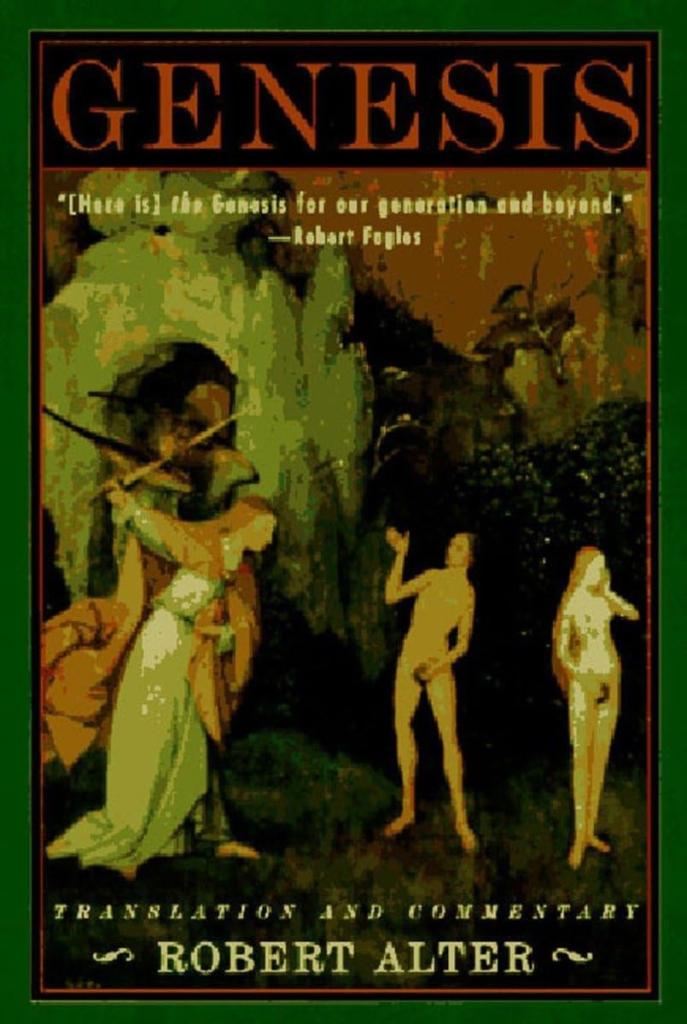If we follow the advice of Robert Alter, we will avoid the pitfall of trying to do explanation in a translation rather than doing an appropriate literal translation and letting the commentary do the explaining. So let’s take a few samples from Alter’s renderings of Gen. 1-5. So in the very first verse of Genesis we have “the earth was then welter and waste’ a rendering of tohu wubohu. As you can see from the transliteration, the Hebrew rhymes, one of the reason various scholars have taken Gen. 1 as poetry. Alter, I think rightly, says no, it is poetic prose, because it is a narrative about a series of events. I don’t love ‘welter and waste’ as an attempt at rhyme, I would prefer ‘lifeless and formless’ because tohu can clear mean emptiness, and what follows talks about God filling up the earth with creatures etc. The next sentence reads “God’s breath hovered over the waters’. True enough nephesh can mean breath, wind or spirit, just as the Greek pneuma can, but here I would prefer the translation wind, not breath, even though it clearly means breath when we hear about how God animated the earth creature made from earth—adam from adama. Wind or spirit can hover, but breath not so much. And here I must take exception to Alter’s seemingly hard and fast rule that context doesn’t determine a word’s meaning. If a word has a range of meaning, surely the context does help one decide which of the range is the right meaning in a particular context.
If we examine Gen. 1 carefully several thinks become apparent: 1) the verb bara meaning create, is only used of God in the OT, without exception, and sometimes it means creatio ex nihilo, creation out of nothing. But 2) a careful reading of Gen. 1 also shows that God uses natural processes to create other aspects of creation, for example we are told that the land itself created or produced some things, so the description is not all about creation out of nothing; 3) it is not until the 4th day that the sun of our solar system is said to be created, and this in turn means that the first three ‘days’ as they are called are not solar days as in our solar system. The point of the the descriptions is to make clear that there was a method to God’s creating and an orderliness no matter how long it took, and generally speaking the order of creation of air, water land, then animals and things to eat, and last of all human beings makes sense whether one is considering this account and comparing it to evolutionary theory, or simply appreciating the orderliness of God’s creating. 4) not only because the first 3 days are not solar days, but also because at the end of the account the phrase ‘and it was evening and morning’ ceases with the 6th day (see Origen, de Principiis 4.1.16, “For who that has understanding will suppose that the first and second and third day existed without sun, moon or stars?”). The seventh day, where God ‘ceased’ from creating is still ongoing if one is talking about initial creation that started the universe. And there is nothing in this account that means we should take this poetic prose to mean that God accomplished all this in a mere six 24 hour days— which would mean six solar days. Nor can we figure out how long ago God did this by a close reading of the genealogies, not least because they are not exhaustive, even if we start with King David in about 1000 B.C. and work backwards. The point is God is the creator, however long it took, and however long ago it happened, and we are the creatures, and this fundamental creator/creature distinction is crucial to Biblical theology. Among other things, it means creatures and material creation itself are not part of God, nor are they defiled by human examination and use. This is in fact the basic assumption of science, ancient and modern– we are not commiting a sacrilege by examining and trying to understand creation. There are no holy cows out there that should not be touched or used to examined. This is a fundamental difference between Hinduism and other religions that suggest that everything is part of the divine, and Biblical religion. 5) Of course the sticking point for most Christians is not whether or not some creatures evolved over time, and in some cases became something that really were not before— e.g. like caterpillar becoming a butterfly. It does not matter if some sea creatures evolved and became land creature. The sticking point has to do with human beings, because the Genesis account suggests they were uniquely created, they did not evolve from primates for example. Equally devout Christians view, whilst rejecting atheistic evolutionary ideas, may in fact affirm theistic evolution, or some sort of creation theory involving humans that does not deny all aspects of evolutionary theory. At Biologos, these things are properly discussed and debated by Christians.
When we get to Gen. 1.26 Alter wants to make clear the connection between humans being made in God’s image and likeness and the task they were being asked to do so the text reads “by our likeness, to hold sway over the fish of the sea and the fowl of the air”. This provides a clear clue as to what uniquely being in the likeness was all about for humans– they were to rule over the creation.
Getting to Gen. 2.3 we hear: “And God blessed the seventh day and hallowed it, for on it He had ceased from all His work that He had done”. This seems clearly to be the right translation, and you will notice that the translation does not say ‘rested from his work’ as if God was worn out after a hard week of creating the whole of the universe! There is not here a sabbath teaching like we find in the Mosaic covenant, not least because God doesn’t inherently need rest. The text merely means he ceased from creating and admired his good work. But what does hallowed really mean? Does it mean a day set aside for appreciation of creation? When one gets to the NT it seems clear that Jesus doesn’t take it to mean that God entirely stopped working on a particular day, for Jesus says ‘my Father is always working’. And indeed, Jesus deliberately set about healing people on the sabbath which clearly was some sort of work. Indeed, Jesus seemed to see sabbath as the perfect day to give people wholeness and healing– true shalom. So again, Genesis would seem to mean ‘cease from creating, and admire the work done’ because it was tov mu’ov, very good indeed. The God of the Bible is no Gnostic– he believes the material creation is inherently good, but it can be spoiled, tainted.
In Gen. 2.8— nephesh hayah surely means ‘a living being’ with God having animated the creature he formed from the earth. It does not mean ‘a living soul’ There is no body/soul dualism here and the later Greek notion of the immortal soul should not be read back into the Bible.
Gen. 2.18 reads ‘it is not good for the human to be alone; I shall make him a sustainer beside him’. This is an appropriate translation, much better than help meet or helpmate. I prefer ‘suitable companion’. Alter notes “the second term means alongside him, opposite him, a counterpart to him. Help is too weak a term because it suggests a merely auxiliary function whereas ezer elsewhere connotes active intervention on behalf of someone”. (p. 9). In any case the Hebrew here doesn’t imply the subordination of the woman to the man. If anything it implies that the man needed someone, for it was not good for him to be alone. the subordination of a wife to her husband only comes as part of the curse on Eve for sinning and leading Adam into sin. Put another way, it is a result of human sin and results in patriarchy– “and he shall rule over you”.
‘The human’ only first speaks when God assigns him the task of naming the creatures.














